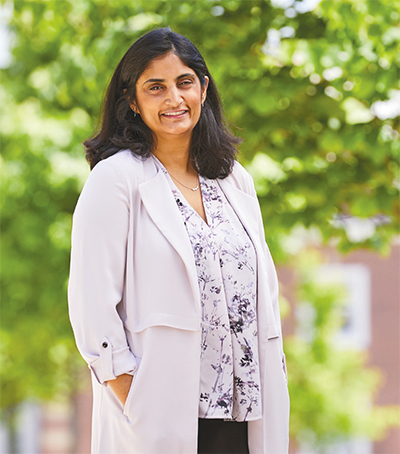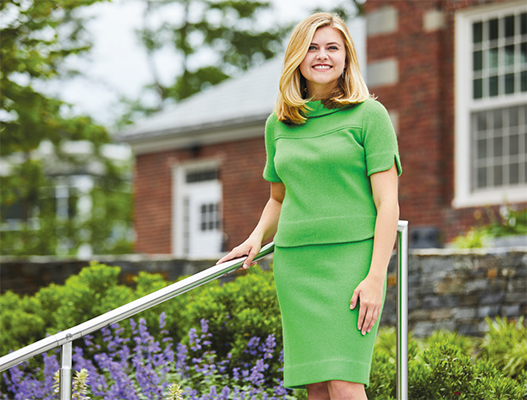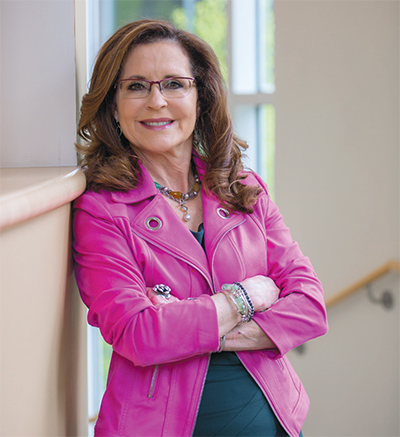
Photo: Tom Kates
Shay Jaffar MBA’19 came to Babson to make the switch from corporate executive to entrepreneur. Thinking she’d work in venture capital before starting her fashion line, after seeing what the College had to offer she decided to go straight for her dream.
That meant she’d need to learn how to pitch to potential investors, something out of her wheelhouse. Jaffar knew this process wouldn’t be painless. There would be tough questions. And challenges. And more questions. Lots of questions.
“We had to do it,” she says of the practice pitch sessions done during the Summer Venture Program, a business accelerator that’s part of The Arthur M. Blank Center for Entrepreneurship. “We needed to feel uncomfortable, and we needed to be OK with that feeling, because this is going to happen—this is going to be real.”
That experience allowed Jaffar to up her game—and her self-assurance. “I realized,” she says, “that people could look at me and say, ‘She’s good, we want to give her a chance.’”
The business world doesn’t always offer men and women a level playing field when it comes to starting an entrepreneurial venture. Women who want to start companies or take their entrepreneurial mindset to startup or corporate executive roles may face daunting challenges. They are often passed over as leaders, denied representation in C-suites, challenged on their knowledge and skills, find it considerably more difficult than men to secure funding for new businesses, and lack established networks that can help them succeed.
But women like Jaffar are finding that they can gain a decided advantage with a solid business education, undergraduate and graduate, that emphasizes entrepreneurship and experiential learning. That type of education happens in the classroom and via programs offering coaching and mentoring, plus guidance in building essential networks. In Jaffar’s case, her pitch for an eponymous modest and fashionable clothing line earned her a finalist spot in the Blank Center’s B.E.T.A. (Babson Entrepreneurial Thought & Action®) Challenge, which celebrates entrepreneurs who are bringing their business ideas to life. She also was given support from the Babson Seed Fund and received the Sorenson Scholarship Award for Meritorious Achievement. Jaffar was awarded the Female Founder Impact Award from the Center for Women’s Entrepreneurial Leadership (CWEL), one of few business school centers in the country that focuses on women. After graduation, Jaffar moved to New York, where she is working full time on her venture, and “continuing the road that Babson paved for me.”

Lakshmi Balachandra, assistant professor of entrepreneurship
Photo: Pat Piasecki
For any industry, “the more knowledge and prep you have, the better,” says Lakshmi Balachandra, an assistant professor of entrepreneurship who teaches Foundations of Management and Entrepreneurship, a required first-year course where students work in teams to build, launch, and run an actual business. Similarly, Babson’s Management Consulting Field Experience (MCFE) pairs Boston-area companies with student teams who work as consultants on actual business challenges.
“When you come to an entrepreneurship class,” Balachandra says, “you learn about the foundations of building a business plan, and how to prepare the financials the way investors want to see them. Having that educational component gives you a huge leg up.”
But the most important component, she adds, may be learning how to work with other people: “How do you lead, how do you communicate with investors, how do you manage all these moving parts?” That students are thrown into these situations from day one makes the program unique, and offers women opportunities they may not get in the real world, especially starting out. Balachandra adds that she has seen more women pursuing and attaining leadership roles in the class, “and that has been incredibly exciting.”
From Mentee to Mentor
“I don’t think you can go into entrepreneurship without thinking it will be hard,” says Mackenzie Page ’20. Choosing entrepreneurship factored into her becoming a CWEL Scholar, which not only provided a partial scholarship, but also tremendous opportunities for working with a mentor, becoming a mentor, and creating a network of like-minded women.

Mackenzie Page ’20, a CWEL Scholar
Photo: Pat Piasecki
Page’s CWEL experiences have been profound. “When I first came to Babson, I had a really great peer mentor,” she says. “She was excellent in showing us how strong we could be, how much we could embrace—she was a great role model, and this was my first glimpse into what a mentorship can be.”
Taking part in CWEL networking sessions has allowed Page to feel comfortable approaching complete strangers in business-social settings, which can be daunting for some. “It has really lifted my confidence,” she says. In her first-year FME class, she was a co-CEO with a male classmate, and learned how creative problem solving could tackle tough challenges. In her second year, she became an FME mentor to first-year students, which she calls “a fantastic experience.”
Changing the System
Make no mistake—educational programs that help women become entrepreneurs are no indication that women’s skills and abilities are inferior to those of men.
“The solution to challenges women face in starting and growing businesses is not just to educate, train, or fix the women” says Candida Brush, vice provost of global entrepreneurial leadership and the F.W. Olin Distinguished Professor of Entrepreneurship. Rather, the system needs to change. A male-dominated finance industry, for example, needs to recognize that women-owned businesses are worthy of investing.
“One of the reasons why Babson’s WIN (Women Innovating Now) Lab® was created,” she adds, “was because women were being left out of highly competitive venture accelerators. The education and mentoring that the WIN Lab provides is the same support available in other accelerators.” The WIN Lab, which is part of CWEL and found at Babson’s Boston and Miami campuses, allows women to expand their ventures by testing and tweaking their ideas. Women also have access to experts in various fields, and opportunities to showcase their company and be coached on how to pitch.

Susan Duffy, executive director of CWEL
Photo: Dan Vaillancourt
Susan Duffy, CWEL’s executive director, says the center adds to the “already exceptional functional education that Babson is providing. This center is about building that successful entrepreneurial leader and giving them the tools they need to identify opportunities and overcome challenges that may arise as they navigate their careers.” Combining mentorship, leadership acumen, networking, and immersive learning experiences, she adds, “CWEL emphasizes business skills, while creating opportunities for emerging women leaders to build their self-efficacy— something that research tells us is vital to success.”
At her summer internship working in data operations and analytics for an insurance group, Page already can see the benefits of what she has learned, including presentation skills she has drawn on for her job. “In FME, you have to do presentations throughout the year, and that helps you build up your confidence,” she says. “Early on at Babson, it was quite apparent to me what the College was preparing me for. Like most people I’m nervous on my first day of a new job, but it’s great to remind yourself that you have tons of classwork and experience under your belt.”
